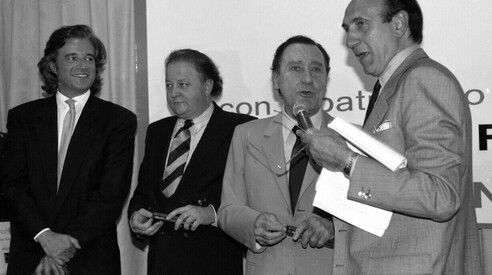In Praise of Christian Democracy by Pippo Baudo


The comment
Mike, said Umberto Eco, was the average man, Baudo was the incarnation of the Christian Democrat idea of Italy: merit and moderation, like his career and his programs, reassuring like a Sunday mass but without the boredom of the sermon.
Just as Umberto Eco celebrated the ordinariness of Mike Bongiorno in his celebrated phenomenology, it's time to glorify the Christian Democrat nature of Pippo Baudo. If Bongiorno was the average Italian elevated to a paradigm, Baudo was the embodiment of a Christian Democrat idea of Italy. The living epiphany of the crossed shield that dominated television with the imperturbable grace of someone who knew he represented not only himself, but an entire worldview. In April 1960, a RAI bureaucrat profiled him as follows: "Giuseppe Baudo, 24 years old. A fantasist. Good presence. Good video. Decent singing. Decent piano playing. NB: can be employed for minor programs." How much Christian Democratism there is in that "decent" repeated twice! The nomenclature that dismisses TV's greatest host with bureaucratic condescension is flawed, but ultimately finds the right adjective: Baudo's entire life would be a resounding rematch of that reputation. Until his supreme, almost Wagnerian, idea: to die on a Saturday night, in prime time, thus disrupting the schedule.
Baudo embodied the idea of success the Christian Democrats had always preached. Social ascension through merit tempered by moderation. Talent that doesn't become arrogance and idle vanity. The climb from Militello in Val di Catania to Viale Mazzini: a Christian Democrat Italian dream. The provincial Sicilian who auditions and makes it, alone, in the land of connections. His "Domenica In," his "Fantastico," his Sanremo were Christian Democrat cathedrals of entertainment: everything had to be perfectly balanced, equidistant, reassuring, clear. Revolutionary songs were tamed by the set design, transgressive singers softened by the soft lights of the Ariston. Baudo was as reassuring as a Sunday mass, but without the tedium of a sermon —and with the obsessive attitude of a variety show Stanley Kubrick, controlling everything and putting on a perfect show. As a talent scout, he was the Quincy Jones of state television. The list of discoveries is well known, but the method must be emphasized: Baudo didn't discover talent by chance, he sensed it, cultivated it with the patience of a gardener, and launched it with the timing of a seasoned politician. Once again: a Christian Democrat.
He was an integral part of public service broadcasting even when he worked at Mediaset, because he embodied the Christian Democrat idea of television: pedagogical without being academic, popular without being populist, modern without being revolutionary. "Progress without adventure"—the White Whale's slogan transformed into an aesthetic credo. A great friend of Ciriaco De Mita, he recalled that his father had studied with Mario Scelba and at Don Luigi Sturzo's high school. "Being a Christian Democrat doesn't mean belonging to a party. It's a way of understanding life." And the Scelba of "culturame" would find a worthy heir in Pippo Baudo. The DC lacked artists, writers, directors, or great intellectuals—in fact, it was the target of the cultural world. But it did have Pippo Baudo, the prophet of a national-popular counter-hegemony that staked everything on RAI. While the Communists enjoyed Einaudi's high culture, civic cinema, and committed writers, the Christian Democrats held their ground on Saturday night, and that was enough: they understood that it was there, in their living rooms, that the real cultural battle was taking place. Baudo reassured Italians as protests, sexual revolutions, terrorism, and then bribes exploded. He was the great neutralizer of excess and extremes. The alchemist of moderation: everything he touched became digestible.
A few months before Tangentopoli, he spoke at a DC congress in Brescia. He spoke of imminent collapse. He sounded the alarm: "A self-reform of the crossed shield is necessary ; we need to roll up our sleeves and invent something new. Only a large party can mediate the most diverse interests. Small groups seem to me to be riddled with populist demagoguery." In a parallel world, he would have been the leader of the large moderate party we lack. As long as television lasts, wherever there is someone trying to please everyone without displeasing anyone, the shadow of Pippo Baudo will still be there. Imperturbable. Majestic. Christian Democrat.
More on these topics:
ilmanifesto





